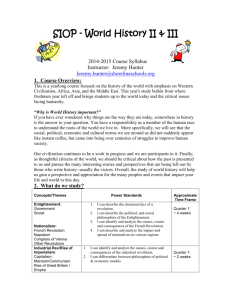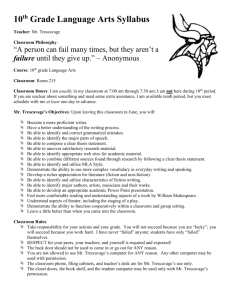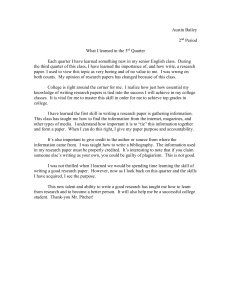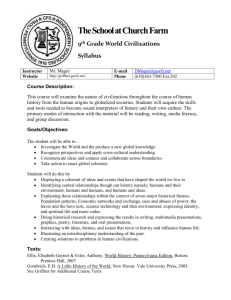(10th) wh2,3_csdesc_online_15.doc
advertisement
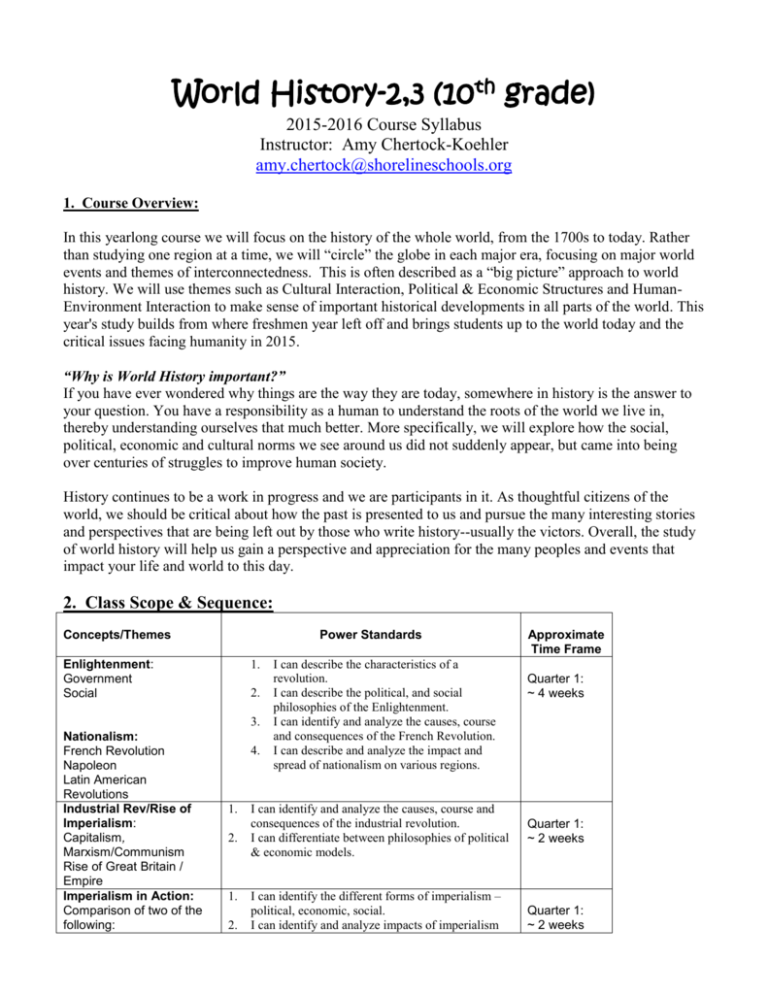
World History-2,3 (10th grade) 2015-2016 Course Syllabus Instructor: Amy Chertock-Koehler amy.chertock@shorelineschools.org 1. Course Overview: In this yearlong course we will focus on the history of the whole world, from the 1700s to today. Rather than studying one region at a time, we will “circle” the globe in each major era, focusing on major world events and themes of interconnectedness. This is often described as a “big picture” approach to world history. We will use themes such as Cultural Interaction, Political & Economic Structures and HumanEnvironment Interaction to make sense of important historical developments in all parts of the world. This year's study builds from where freshmen year left off and brings students up to the world today and the critical issues facing humanity in 2015. “Why is World History important?” If you have ever wondered why things are the way they are today, somewhere in history is the answer to your question. You have a responsibility as a human to understand the roots of the world we live in, thereby understanding ourselves that much better. More specifically, we will explore how the social, political, economic and cultural norms we see around us did not suddenly appear, but came into being over centuries of struggles to improve human society. History continues to be a work in progress and we are participants in it. As thoughtful citizens of the world, we should be critical about how the past is presented to us and pursue the many interesting stories and perspectives that are being left out by those who write history--usually the victors. Overall, the study of world history will help us gain a perspective and appreciation for the many peoples and events that impact your life and world to this day. 2. Class Scope & Sequence: Concepts/Themes Power Standards Enlightenment: Government Social 1. 2. 3. Nationalism: French Revolution Napoleon Latin American Revolutions Industrial Rev/Rise of Imperialism: Capitalism, Marxism/Communism Rise of Great Britain / Empire Imperialism in Action: Comparison of two of the following: 4. 1. 2. 1. 2. I can describe the characteristics of a revolution. I can describe the political, and social philosophies of the Enlightenment. I can identify and analyze the causes, course and consequences of the French Revolution. I can describe and analyze the impact and spread of nationalism on various regions. I can identify and analyze the causes, course and consequences of the industrial revolution. I can differentiate between philosophies of political & economic models. I can identify the different forms of imperialism – political, economic, social. I can identify and analyze impacts of imperialism Approximate Time Frame Quarter 1: ~ 4 weeks Quarter 1: ~ 2 weeks Quarter 1: ~ 2 weeks East Asia South Asia Africa Latin America Russian Revolution: 1905-1917 WWI: Fall of Ottoman Empire Treaty of Versailles Interwar Years: Rise of Totalitarianism Global Depression Holocaust 3. on the colonizing nation. I can identify and analyze the impacts of imperialism on the colonized people. I can identify and analyze the causes, course and consequences of the Russian revolution. I can identify and analyze the causes, course and global consequences of World War I. 1. 2. 3. WWII: 1. (no US emphasis) Theaters of Battle (Europe and Asia) War Atrocities 2. Impacts and Results of WWII: Creation of UN & Decl. of Human Rights Nuremberg Trials New World Map Cold War 1. Modern World -Decolonization, Independence, and Nationhood: Case Study Options: South, East, SE, Asia Africa, ME, Lat America 1. Social Studies Skills: The following skills will be further developed during this year. 2. 3. 2. 3. 1. 2. 3. 4. 5. 6. 7. 8. 9. I can identify and analyze the rise of totalitarianism. I can explain the causes and consequences of the global depression. I can identify the changes to political boundaries after WWI. I can identify the causes, course and consequences of WWII. I can explore and evaluate moral issues involved in war. I can explain the purpose of the formation of the United Nations and the Universal Declaration of Human Rights. I can explain the geo-political impacts of World War II. I can define the Cold War and its impact on the world. I can compare and contrast post-war independence movements. I can explain political, economic and social development since World War II. I can connect contemporary global issues in to their historical origins and evaluate their impact. I can use organizational strategies to support my learning. I can find and evaluate a variety of sources through research. I can differentiate between primary & secondary sources. I can use critical thinking skills when evaluating social studies content. I can demonstrate effective communication through a variety of methods. I can employ multiple strategies to effectively read and understand a variety of materials. I can articulate a clear position/thesis. Quarter 2: ~ 2 weeks Quarter 2: ~ 2 weeks Quarter 2: ~4 weeks Semester 2 Quarter 3: ~ 2 weeks Quarter 3: ~ 2 weeks Quarter 3 & 4: ~ 12 weeks Used throughout each unit. I can support a position/thesis with appropriate evidence. I can use proper MLA citation (parenthetical notation & works cited). 3. Course Expectations: Here are some of the basic things you can expect from me: I will treat you with respect. I will come to class each day prepared with meaningful, well thought-out lessons. I will remember to have an appropriate sense of humor and a healthy amount of patience. I will maintain high academic standards to challenge you and increase your learning. Here are some of the expectations I have of you: You are expected to arrive to class ON TIME (IN YOUR SEAT WHEN THE BELL RINGS). You must be ready with materials and assignments at the start of class. You are expected to TRY – even when it may seem too hard, easy or even boring. You are expected to remember that this is a public classroom, NOT your private home. Please use your manners and maintain a sense of community. Think of others before yourself. Your are expected to take care of all matters due to absences (excused and unexcused). Do this during appropriate times and using the procedures shown to you. You are expected to be polite and respectful when interacting with your teacher and classmates. This means that you will: listen to what is being said – don’t be inattentive or a distraction; observe appropriate times to make a statement, ask questions or get up; be thoughtful about your words. No putdowns or rude language. You are expected to participate fully in class/groups activities. You are expected to teach and learn from one another. You are expected to help take care of our classroom materials and supplies. What happens if a student fails to meet these expectations? General rule violations result in: 1) Verbal warning 2) Student/teacher conversation 3) Teacher email/phone call to parent/guardian, Dean of Students and counselor regarding behavior. Drafting of student behavior action plan. 4) Discipline referral to Dean of students. Note: Depending on situation and severity of the offense, your immediate removal from the class may be necessary. My reaction will directly correlate with your action. Assessment: A = 100 - 92.5 A- =92.4 -89.5 B+ = 89.4 - 86.5 B = 86.4 - 82.5 B- = 82.4 – 79.5 C+ = 79.4 – 76.5 C =76.4 -72.5 C- = 72.4 – 69.5 D+ = 69.4 –66.5 D = 66 – 59.5 F = 59.4 – 0% Your grade will be determined in the following categories: 1. Tests and Projects (45%) 2. Homework and Daily work (40%) 3. Participation/Citizenship (15%) Your performance will be assessed in a variety of ways. Of course you can expect regular tests and quizzes, but in addition you will be responsible for completing such tasks as: - Reading, reading, reading (textbook, supplemental texts, primary sources) - Socratic seminars - debates/dialogs - oral presentations - Cornell Notes - research papers - unit tests - group and individual research projects - written & spoken responses to tiered questions Homework: The homework assignments in this class are designed to prepare you for the next day’s activities. As such, all homework is due at the beginning of class. If a homework assignment is turned in during or at the end of class, it is considered late. Late Work: You will be given ample notice of all assignment deadlines. Homework that is not turned in at the beginning of class is considered late, and will only receive partial credit. You have one week from the original due date to turn in late assignments; after this day, you will receive a zero for that assignment. Extra Credit: Extra credit opportunities may be provided to expand on the concepts we’re learning in class; extra credit is not made available simply to earn back points lost by missing assignments. Honesty Policy: You are required by the Shoreline School District to abide by its board policies on Ethics and Honesty. This means doing your own work and appropriately citing sources when you paraphrase or quote someone else’s ideas; overall, be honest and truthful in what you submit in class. CHEATING AND PLAGIARISM ARE ABSOLUTELY UNACCEPTABLE and grounds for disciplinary action. Any time you copy the writing, words, ideas or concepts of another and pass them off as your own, you are plagiarizing. If someone else does your work, you are cheating. If you let someone else copy off of your work, you are cheating as well. If you work with someone on individual work, copy homework, let someone copy your homework, cheat on a quiz or test or use language or ideas directly from a research source, you will be subject to the Shoreline School District’s uniform policies on Ethics and Honesty Tardies: Avoid at all costs. Class begins right at the bell and it is critical that you are there on time. Respect yourself and your classmates (not to mention me, your teacher) by being in your seat, ready to work and learn when the bell rings. Attendance: Your attendance is your responsibility. When you are gone for an excused absence, check the weekly syllabus & my website (the Documents section) and then check the Absence Folder in class to see what you missed. Next ask your classmates for information, or see me before or after school or during lunch or during SAS on A or E-days. For each day you have an excused absence you are allowed one make up day for daily assignments; if you are going to be absent during a test, presentation or role play, you must see me in advance. If you do not, PARTICIPATION POINTS EARNED DURING A ROLE PLAY OR PRESENTATION CANNOT BE MADE UP. Work missed during unexcused absences (including exams or in-class work) cannot be made up and will receive a zero. Food & Drinks: Water is permitted. That’s it – nothing else! It gets messy and is a distraction. You may eat a snack in my room before or after class, but between the bells we are focused on learning history. Bathroom Breaks: Use the bathrooms before and after class! Frequent interruptions to request bathroom trips disrupt instruction and learning activities. See me if you have any special needs in this area. Electronics: All electronics, cell phones, earphones, laptops, iPads, etc. must be on silent mode and stored out of sight before the bell rings. I will give permission to use your iPads and other electronics based on my discretion. If I your cell phone rings or you’re texting during class, your phone may be taken and held by the Dean of Students until the end of the school day. Materials: For each class period please be prepared with; 1. Small 3-ring binder OR folder with pockets to hold loose-leaf handouts & returned work (readings, course description, project directions, etc.). You will need to save assignments and notes to help you prepare for your semester assessments. 2. Spiral notebook – this will be where you take notes, do most homework & classwork assignments, do process pieces/rough drafts for longer assignments, etc. 3. Pens and Pencils. 4. Your own small tape dispenser and small stapler. 5. A charged iPad. You will also be issued a World Connections text book (replacement cost $107) and an account to access the textbook online. You are not required to bring the hard-back textbook to class, as long as you have your charged iPad with access to the online version of the textbook. World History 2-3 1700’s to Present First Quarter The World Today & History: They’re Connected! 4 Themes in Contemporary Issues Mapping Key Places to Know Group News Project The First Global Age Primary Source Evaluation & Analysis “Collision at Cajamarca” A Shifting Global Map – 17th Century Third Quarter World War II Major Events - European & Pacific Fronts Annotated Group Timeline Aftermath of War Post-War Independence Movements The New World Map Case Studies – India & China Revolutions – Political Systems The Enlightenment: What is the ideal government? French Revolution Case Study Global Political Revolutions Comparison Focus on: Latin America Cold War Hot Spots in the Cold War Case Study: Latin America Simulation: Bullets or Ballots Revolutions – Economic Systems The Industrial Revolution Economic Theories – Adam Smith, Karl Marx Ideas & Inventions - Major Research Essay Fourth Quarter Second Quarter Imperialism – Causes Political, Economic, Social Imperialism Focus on: The Scramble for Africa World War I Penland Roleplay Causes and Consequences of WWI Modern Warfare Russian Revolution & Interwar Years Communism & the Soviet Union Rise of Totalitarianism The Holocaust Modern World – Middle East & North Africa Case Studies: Palestinian & Israeli Conflict; Oil & Water Issues; Revolutions Post-“Arab Spring” Simulation: Middle East Peace Summit The Modern World – Returning to the 4 Themes in Contemporary Issues Art Project – Global Contemporary Issues & History Discussion-based Analysis of History & the Present– Understanding the News, Shaping our Views, What Can WE Do? Course Commitment I have read and understand the World History-2,3 Course Description and I am aware of the Shoreline School District’s Ethics and Honesty Policy. I agree to abide by the course and district expectations for me as a student in this course. I also take responsibility for my own learning, and will do my best to be successful in this class. Student Name (Print): ___________________________________________________ Student Signature: _________________________________________Date_________ Parent/Guardian Name (Print): _____________________________________________ Parent/Guardian Signature: _________________________________ Date__________ For Guardians: What is your email address? What is the best way to contact you during the day? During the evening? Is there anything I should know to help your student do well in this class? (Any and all information is helpful!). Please feel free to email this to me at a later date if you prefer. Email: amy.chertock@shorelineschools.org
